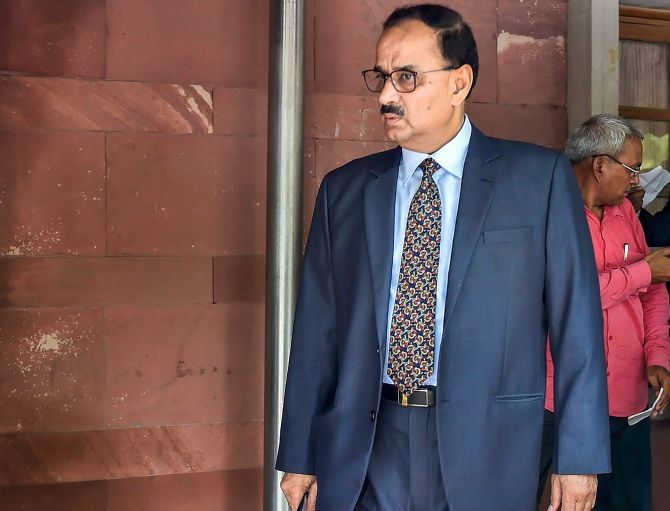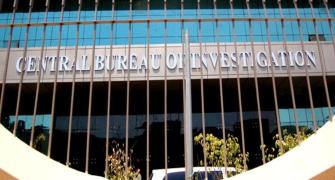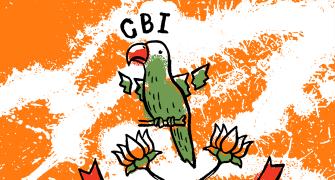While the Congress and other opposition parties hailed the verdict and said it was a “slap” on the Modi government which had transferred him “illegally”, Finance Minister Arun Jaitley described the verdict as “balanced.

In a jolt to the Centre, the Supreme Court on Tuesday reinstated Alok Verma as Central Bureau of Investigation director quashing its unprecedented “overnight” order in which he was stripped of his power and sent on leave along with his deputy after they traded corruption charges sparking a bitter feud.
The court, however, clipped Verma’s wings saying he cannot take any major policy decision till the high-powered committee, which selects the CBI chief, decides on his continuation since the Central Vigilance Commission is probing charges of corruption against him. Verma’s two-year tenure as CBI director ends on January 31.
Asking the committee to meet within a week, the court said it was “still open” for the panel to consider the matter involving Verma. The committee comprises the Prime Minister, the Chief Justice of India and the Leader of the Opposition in the Lok Sabha.
Holding that the statute does not have any provision with regard to interim suspension or removal of the CBI director, the court made it clear that any such decision has to be taken after obtaining the consent of the selection committee.
There was neither immediate reaction from Verma nor any official word when he will resume charge.
WATCH: Politicos react over SC's verdict on Alok Verma
The central issue before the court was whether the CVC and the Centre had the authority to divest Verma of his powers as CBI chief in the wake of his feud with Special Director Rakesh Asthana. Both Verma and Asthana levelled charges of corruption against each other.
Like Verma, Asthana was also divested of his powers and sent on leave by the government on the same night of October 23.
Asthana has not challenged the order but moved the Delhi high court for quashing of the FIR against him in a corruption case.
The Congress and other opposition parties hailed the verdict and said it was a “slap” on the Modi government which had transferred him “illegally”.
Congress president Rahul Gandhi said “some justice” has been done and now Prime Minister Narendra Modi cannot run away from an investigation into the Rafale deal and that “no one can save the prime minister”.
The Communist Party of India-Marxist demanded Modi’s resignation, while the Aam Aadmi Party, Peoples Democratic Party, Rashtriya Janata Dal said the verdict was an “indictment” of the his government.
Gandhi said Verma was ousted in the middle of night, alleging he was initiating a probe into the Rafale deal.
Senior Congress leader Mallikarjun Kharge, who is part of the high powered committee by virtue of being the leader of the single largest party in the Lok Sabha, said the order was a “lesson” for the government.
Describing the verdict as “balanced”, Finance Minister Arun Jaitley said the Centre’s decision to send Verma and Asthana on leave based on CVC’s recommendation was “perfectly bonafide” and that it was done to protect the integrity of the investigating agency.
The decision by the government was completely legal as the two officers in question were at loggerheads, he said.
CPI-M general secretary Sitaram Yechury demanded that the prime minister quit on moral grounds as the verdict was a “direct indictment of Modi and his office”.
WATCH: Restoring Alok Verma as CBI director a partial victory: Prashant Bhushan
Delivering a 44-page verdict in what is known as the ‘CBI vs CBI case’, a three-judge bench headed by Chief Justice Ranjan Gogoi set aside the October 23, 2018 orders of the CVC and the Department of Personnel and Training divesting Verma of his powers and asking CBI’s Joint Director M Nageshwar Rao to look after the duties and functions of the agency’s Director.
“We deem it proper to direct that Verma, Director CBI, upon reinstatement, will cease and desist from taking any major policy decisions till the decision of the committee permitting such actions and decisions becomes available within the time frame indicated,” it said. The bench also comprised Justices S K Kaul and K M Joseph.
The verdict was pronounced on a petition by Verma challenging the order of the government sending him on forced leave and appointing an interim chief, arguing that the CBI chief has a fixed two-year term and can be removed only by the high-powered committee.
“We further make it explicit that the role of Alok Kumar Verma as the Director, CBI during the interregnum and in terms of this order will be confined only to the exercise of the ongoing routine functions without any fresh initiative, having no major policy or institutional implications,” the top court said.
The bench referred to its verdict in the Vineet Narain case and subsequent amendment in law to drive home the point that legislative intent has been to ensure “complete insulation of the office of the Director CBI from all kinds of extraneous influences, as may be, as well as for upholding the integrity and independence of the institution of the CBI as a whole”.
The Vineet Narain judgment, delivered by the apex court in 1997, relates to investigation of allegations of corruption against high-ranking public officials in India.
The top court referred to a provision of the Delhi Special Police Establishment Act, which said that the CBI director cannot be transferred without the consent of the selection committee.
It said the legislature did not intend to confer any authority to the state to take interim measures against CBI director in such an eventuality.
“If the word ‘transferred’ has to be understood in its ordinary parlance and limited to a change from one post to another, as the word would normally convey and on that basis the requirement of ‘previous consent of the committee’ is understood to be only in such cases, i.e. purely of transfer, such an interpretation would be self-defeating and would clearly negate the legislative intent,” the bench said.
It said the institution of CBI has been perceived to be necessarily kept away from all kinds of extraneous influences so that it can perform its role as premier investigating and prosecuting agency “without any fear and favour and in the best public interest”.
“The head of the institution, namely, the Director, naturally, therefore, has to be the role model of independence and integrity which can only be ensured by freedom from all kinds of control and interference except to the extent that Parliament may have intended,” it said.
The bench said all authorities should be kept away from “intermingling or interfering” in the functioning of CBI Director.
Dealing with the situation where authorities may require to take action against the CBI director, the bench said public interest must be writ large against the backdrop of the necessity and such a “compelling necessity can only be tested by the opinion of the committee”.
The judgment was authored by CJI Gogoi. However, the CJI didn’t attend court and it was pronounced by Justice Kaul.
The apex court noted that CBI has grown over the years in its role, power and importance and today it has become the premier investigative and prosecution agency of the country.
“The high stature and the pre-¬eminent position that the institution has acquired is largely on account of a strong perception of the necessity of having such a premier agency,” it said.










